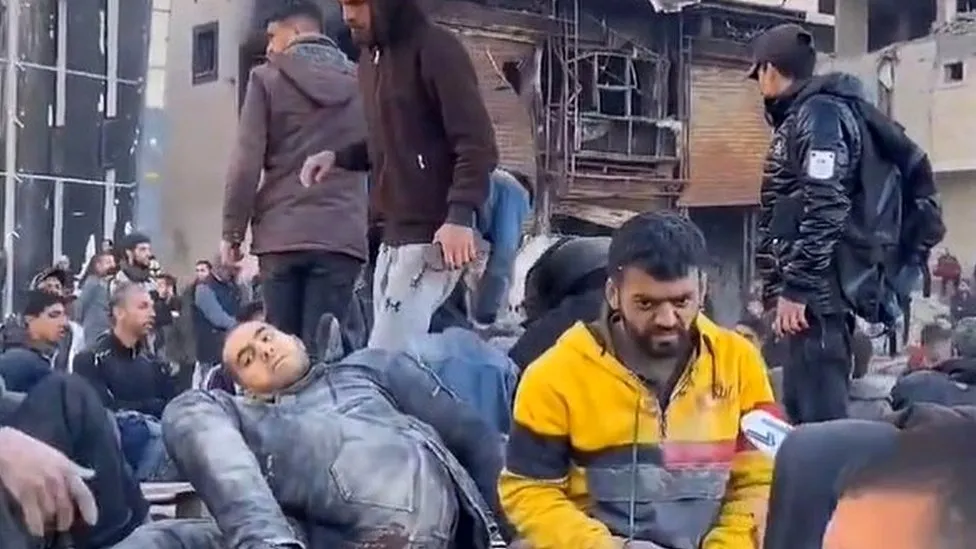Israel-Gaza war: More than 100 reported killed in crowd near Gaza aid convoy, Hamas-run health ministry says
More than 110 Palestinians are reported to have been killed while trying to get desperately needed aid in north Gaza.

Crowds of waiting civilians descended on a convoy of lorries after it passed through an Israeli military checkpoint on the coastal road west of Gaza City.
Israel's military said troops fired at some people they thought were a threat.
In the ensuing chaos, the lorries attempted to move forward. A Palestinian witness told the BBC that most of those who died were run over.
At least 112 people were killed and 760 others injured in the incident, the spokesman of Gaza's Hamas-run health ministry, Ashraf al-Qudra, said in a statement on Thursday afternoon.
Dramatic aerial footage released by the Israeli military showed thousands of people on and around the lorries, while graphic videos of the aftermath posted on social media showed some of the dead loaded onto emptied aid lorries and a donkey cart.
Gaza's Hamas-run health ministry blamed Israel for what it called a "massacre", while US President Joe Biden expressed concern that it would complicate efforts by the US and other mediators to broker a temporary ceasefire in the war between Hamas and Israel.
The incident happened hours before the health ministry announced that more than 30,000 people, including 21,000 children and women, had been confirmed killed in Gaza since the start of the conflict.
Some 7,000 others have been reported as missing and 70,450 have been treated for injuries over the past four months, according to the ministry.
"This is deeply shocking because if you add the number of people who have been injured and the number of people who are missing you have more than 100,000 people, which represents 5% of the population," Philippe Lazzarini, the head of the UN agency for Palestinian refugees (Unrwa), told the BBC.
The UN is also warning of a looming famine in the north of the territory, where an estimated 300,000 people are living with little food or clean water.
The Israeli military launched a large-scale air and ground campaign to destroy Hamas - which is proscribed as a terrorist organisation by Israel, the UK and others - after its gunmen killed about 1,200 people in southern Israel on 7 October and took 253 other people back to Gaza as hostages.
Thursday's incident took place shortly after 04:00 (02:00 GMT), past an Israeli military checkpoint on Rashid Street, which runs along the Mediterranean coast. Palestinian sources gave the location as the Nabulsi roundabout, on the south-western edge of Gaza City.
A convoy of between 18 and 30 aid lorries, likely to have been a few hundred metres long, passed through the checkpoint, heading north.
Shortly afterwards, with the last lorry only about 70m (230ft) north of the checkpoint, Palestinians - many of whom had been camped out nearby, waiting for the arrival of aid - descended on the convoy.
Israel Defense Forces (IDF) spokesman Lt Col Peter Lerner said some civilians approached the checkpoint and ignored warning shots fired by the soldiers there.
Fearing that some of the civilians posed a threat, the soldiers then opened fire on those approaching in what Lt Col Lerner described as a "limited response".
The BBC's Palestinian witness source did not confirm that civilians approached the checkpoint - only that they were about 70m (229ft) away.
With crowds descending on all the lorries, and with machine-gun fire coming from the checkpoint, panic seems to have ensued.
The lorries - some of them now with many people clinging on - tried to move forward.
The Palestinian witness said the bulk of the casualties were caused by the lorries running people over, not by the Israeli gunfire.
The spokesman of Gaza's Hamas-run health ministry, Ashraf al-Qudra, said that dozens of casualties in a critical or severe condition were brought to the nearby al-Shifa Hospital, in Gaza City, and that medics there were unable to cope with the volume and severity of cases.
At the hospital, one man who was cradling the body of this dead friend, Tamer Shinbari, told the BBC he had gone to Nabulsi roundabout hoping to get a bag of flour for his family who are sheltering in schools in Jabalia.
He said Israeli soldiers opened fire "and the aid lorry ran over the bodies".
The director of the Kamal Adwan hospital in the northern town of Beit Lahia, Hussam Abu Safieyah, told Reuters news agency that it had received the bodies of 10 people and dozens of wounded from western Gaza City.
The acting director of the al-Awda Hospital in Jabalia meanwhile told the Associated Press that it had received 161 wounded patients, most of whom appeared to have been shot.
"Despite the very difficult circumstances (brought about by Hamas' decision to go to war against Israel), we are continuing to work to facilitate the delivery of humanitarian aid to civilians across the Gaza Strip," it added.
"We will learn from this difficult incident in order to try and find better solutions for the transfer of aid to those who need it."
But Hamas and Palestinian President Mahmoud Abbas, who is based in the occupied West Bank, blamed Israeli forces for what they called a "heinous massacre".
"The killing of this large number of innocent civilian victims who risked their livelihood is considered an integral part of the genocidal war committed by the occupation government against our people," Mr Abbas said in a statement, adding that Israel bore "full responsibility".
A spokesman for UN Secretary General António Guterres said he "condemned" the incident.
"The desperate civilians in Gaza need urgent help, including those in the besieged north where the United Nations has not been able to deliver aid in more than a week," Stephane Dujarric said, adding that Mr Guterres reiterated his call for "an immediate humanitarian ceasefire and the unconditional release of all hostages".
The north of Gaza suffered widespread devastation after being the focus of the first phase of the Israeli ground offensive.
It has been largely cut off from humanitarian assistance for several months, despite some relief efforts by UN aid agencies.
Last week, the World Food Programme said it had been forced to suspend aid deliveries to northern Gaza after its first convoy in three weeks was surrounded by crowds of hungry people close to the Israeli military's Wadi Gaza checkpoint, and then faced gunfire in Gaza City.
Another convoy faced what it called "complete chaos and violence due to the collapse of civil order". Several lorries were looted in central Gaza and a driver was beaten.
On Tuesday, a senior UN aid official warned that at least 576,000 people across the Gaza Strip - one quarter of the population - faced catastrophic levels of food insecurity and were at risk of famine.
He also warned that one in six children under the age of two in the north were suffering from acute malnutrition and wasting.
On Wednesday, Gaza's health ministry said six children had died from dehydration and malnutrition at hospitals in northern Gaza. Two of the deaths were at al-Shifa and four at the Kamal Adwan, it added.
-bbc






